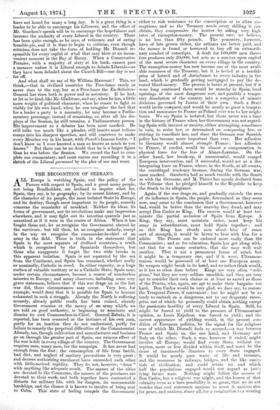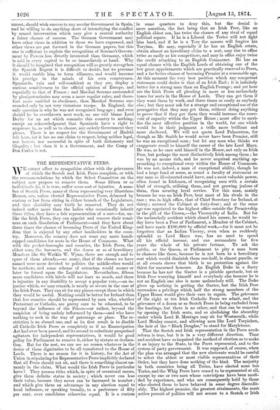THE RECOGNITION OF SERRANO.
ALL Europe is watching Spain, and the policy of the Powers with respect to Spain, and a great many people, not being Bondholders, are inclined to inquire what for. Spain, they say, is by geography, by its recent history, and by the character of its people, the most isolated State in Europe, and its destiny, though most important to its people, scarcely concerns the remainder of mankind. Neither its ideas, its forms of government, nor its revolutions make any impression elsewhere, and it may fight out its intestine quarrels just as unnoticed as if it were in the centre of Africa. When it has fought them out, let us recognise the Government obeyed by the survivors ; but till then, let us recognise nobody, except in the way we recognise the commander-in-chief of an army in the field. There is truth in the statement that Spain is the most separate of civilised countries, a truth which is recognised by the Spaniards themselves, but those who exaggerate it forget the two wide breaks in this apparent isolation. Spain is not separated by the sea from the Continent, and Spain has remained, whether really or nominally, Catholic in creed. In either capacity, as a huge surface of valuable territory or as a Catholic State, Spain may, under certain circumstances, become a source of numberless miseries to Europe ; and many observers, including some very grave statesmen, believe that if this war drags on as the Iast war did, those circumstances may occur. Very few, for example, would deny that it is possible for Spain to become exhausted in such a struggle. Already the North is suffering severely, already public credit has been ruined, already Government remains at the mercy of an army which, we are told on good authority, is beginning to nominate and dismiss its own Commanders-in-Chief. General Zabala, it is reported, has been censured at the instance of his own men, partly for an inaction they do not understand, partly for failure to remedy the perpetual difficulties of the Commissariat. Already, too, though cultivation and manufactures and business go on through the greater part of Spain, one ruinous effect of the war is felt in every village of the country. The Government requires men, many men, for the campaign. It has never had -enough from the first ; the consumption of life from battle, bad diet, and neglect of sanitary precautions is very great ; and decrees authorising enrolment have succeeded each other with little-noticed rapidity. They do not, however, " draw " with anything like adequate result. The masses of the cities are devoted to the Commune, the masses of the provinces are devoted to their work, and both together have contracted a distaste for military life, with its dangers, its unreasonable :hardships, and the chance it is known to involve of being sent to Cuba. This state of feeling compels the Government
either to risk resistance to the conscription or to allow ex- emptions, and as the Treasury needs every shilling it can obtain, they compromise the matter by asking very high rates of exemption-money. The present rate, we believe, is no less than fifty pounds. The peasantry, however, have of late grown richer, the artisans are better paid, and the money is found or borrowed to buy off an extraordi- nary number of conscripts. A draft for 100,000 men there- fore produces only 20,000, but acts as a war-tax upon capital of the most severe character on every village in the country. The exemption-money has now become one of the most avail- able resources of the Treasury, but it is levied at a terrible price of hatred and of disturbance to every industry in the land, which is gradually getting mortgaged to pay the de- tested blood-money. The process is borne at present, but if it were long continued there would be anarchy in Spain, local uprisings of the most dangerous sort, and possibly a tempo- rary dissolution of the country into a congeries of minute divisions governed by Juntas of their own. Such a State would invite conquest, and would be nearly as great a tempta- tion and annoyance to France as Poland ever was to her neigh- bours. We say Spain is isolated, but there never was a time in the history of France when her Government• was not regard- ing Spain with interest or anxiety, either attempting, sometimes in vain, to resist her, or determined on conquering her, or striving to conciliate her, and since the German war Spanish policy has become more important than ever. Her adhesion to Germany would almost strangle France ; her adhesion to France, if cordial, would be almost a compensation in physical force for the loss of Alsace-Lorraine. On the other hand, her break-up, if unsuccessful, would compel European intervention, and if successful, would act as a dis- integrating force on France, where, in the South, at all events, the centrifugal tendency became, during the German war, most marked. Gambetta had as much trouble with the South as with the Germans, and M. Thiers has openly declared from the Tribune that he pledged himself to the Republic to keep the South to its allegiance.
Again, if the war drags on, and gradually extends the area of its influence in Spain, the people, determined as they seem now, may come to the conclusion that a Government, however bad, would be better than the anarchy they dread, and may accept Don Carlos as King. His success would at least ter- minate the partial seclusion of Spain from Europe. A King, they say, must maintain order, must keep his army in subordination, must hold Spain together ; and as this King has clearly men about him of some sort of strength, it would be better to bear with him for a while. The Priests can be endured more easily than the Communists ; and as for education, Spain has got along with- out that for so many centuries, that she may well wait another. That is not a permanent frame of mind, but it might be a temporary one, and if it were, Ultramon- tanism would be possessed of at least one European army. Its weapon might break in its hand, and we rather think would, as it has so often done before. Kings are very often "reli- gious," but they are very seldom unselfish, and they are very apt to consider their own claims 01 at least as sacred as those of the Priesta, who, again, are apt to make their bargains too hard. Don Carlos would be very glad, we dare say, to restore the Temporal Power, if convenient ; but he might not be so ready to embark on a dangerous, not to say desperate enter- prise, out of which he personally could obtain nothing except the passionate hostility of every Liberal in Spain. Still, he might be forced to yield to the pressure of Ultramontane opinion, as Louis Napoleon was forced to yield; and the merest appearance of yielding would, in the present con- dition of European politics, be the •signal for the religious war of which Mr. Disraeli feels so assured,—a war between France and Spain on the one hand, and Germany and Italy on the other. Such a war, however it ended, might involve all Europe, would find every State, without ex- ception, more or less divided within itself, and must be the cause of innumerable disasters to every State engaged. It would be nearly pure waste of life and treasure, and the resources in railways, bridges, and the like essen- tials of civilisation, and could attain no end which half the populations engaged would not regard as justi- fying future wars. Nothing might follow the success of Don Carlos, but• a religious war might, and the horror of that calamity even as a bare possibility is so great, that we do not wonder that cool statesmen anxious to avert it, anxious also for peace, and anxious, above all, for a termination to a wearing
unrest, should wish success to any secular Government in Spain, and be willing to do anything short of intensifying the conflict by armed intervention which may give a central authority a fairer chance of success. The German Government may have other views in addition to those we have expressed, and other views are put forward in the German papers, but this one is sufficient to explain the recognition of Serrano's Govern- ment by Powers less directly interested than Germany, which is said in every capital to be so immediately at hand. Why it should be imagined that recognition will so greatly strengthen the Spanish Regent it is difficult to decide, but we presume it would enable him to form alliances, and would increase his prestige in the minds of his own countrymen. Spaniards, vain and self-confident as they are, display a curious sensitiveness to the official opinion of Europe, and especially to that of France ; and Marshal Serrano surrounded by plenipotentiaries may seem a more regular ruler, and there- fore more entitled to obedience, than Marshal Serrano sur- rounded only by not very victorious troops. In England, the only question is why he was not recognised long ago ; and even should he be overthrown next week, no one will blame Lord Derby for an act which commits this country to nothing, except an acknowledgment that Spaniards have a right to acquiesce in, as well as to choose, any orderly Government they please. There is no respect for the Government of Madrid felt here, for it has no one claim to respect, being neither legal, nor honest, nor successful in spite of both dishonesty and illegality ; but then it is a Government, and the Camp of Don Carlos is not.































 Previous page
Previous page